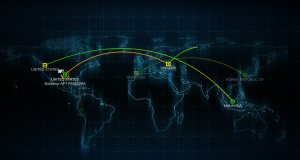An average of 108 cyber-crimes occurred in New Zealand per day in 2016, an increase of 163 percent over the previous year, according to a new study.
The most common type of the attack in the country was cyber ransoming, where hackers seize your files and demand money to get the key to decry-pt those files, Tech Company Symantec revealed in its new Internet Security Threat Report.
The study states that the cyber-criminals often demand up to $400 from the individuals to decry-pt files, but from bigger organizations and businesses, thousands of dollars may be demanded.
 “The reason New Zealand is targeted is that we are an affluent nation, but certainly they recognize that there is a lot of monetary gain to be made out of both ransom ware and the specific markets that they target,” said Symantec’s Mark Shaw.
“The reason New Zealand is targeted is that we are an affluent nation, but certainly they recognize that there is a lot of monetary gain to be made out of both ransom ware and the specific markets that they target,” said Symantec’s Mark Shaw.
“So we see New Zealand and Australia – Australia actually came in number one, we came in number four – as being consistent and continual targets for ransom ware campaigns.”
Mr Shaw said a new class of professional cyber criminals, who are highly-skilled and well resourced, buy advertisements on the websites to spread their malware.
The most common type of the attack in the country was cyber ransoming, where hackers seize your files and demand money to get the key to decrypt those files
The low-level cybercriminal, on the other hand, he said, are setting up call center operations to extend the reach of their scams.
 “What we’ve seen in the last couple of years is cybercriminals actually buying advertising that will pop up in a browser or on Facebook – and within that, advertising putting up a prompt that appears on your PC that says, there’s a problem with your PC, call this toll free number to speak to someone to assist.
“What we’ve seen in the last couple of years is cybercriminals actually buying advertising that will pop up in a browser or on Facebook – and within that, advertising putting up a prompt that appears on your PC that says, there’s a problem with your PC, call this toll free number to speak to someone to assist.
“So rather than the cybercriminals calling you, they are no enticing people who might get sucked into that particular scam to actually call them at their call center, and they’ll talk you through a number of steps to fix your machine. Of course, what they are doing is installing fake anti-virus software, or they might be malicious software.
The report revealed that around 50 million personal information records were stolen or lost in 2015.
And Mr Shaw said the figure was usual as New Zealand is among those countries where mandatory laws to report breaches do not exist.
“New Zealand and Australia are two countries where we don’t have mandatory laws, so if I’m an organization and I lose your data as a customer, I have no obligation (to report) that it’s taken place even though you could be impacted by that.
“Your data could end up in the hands of somebody else, it could be traded on the underground economy, and those credentials could be used in other services.
 Mr Shaw emphasized on the need for effective legislation for reporting of data breaches in New Zealand to control rapidly expanding cybercrime rate in the country.
Mr Shaw emphasized on the need for effective legislation for reporting of data breaches in New Zealand to control rapidly expanding cybercrime rate in the country.
“It makes so much sense that now we’re doing a lot of our business online that the organizations holding our data are held accountable,” he said.











